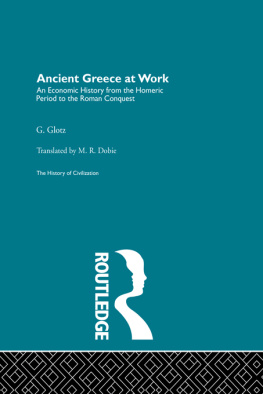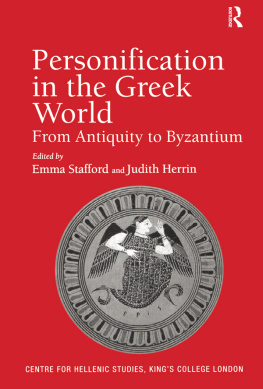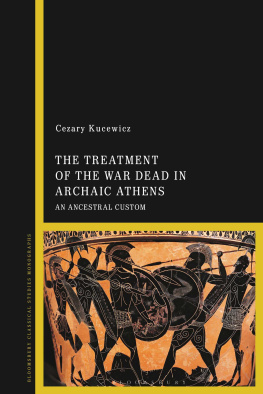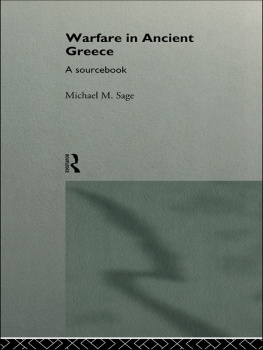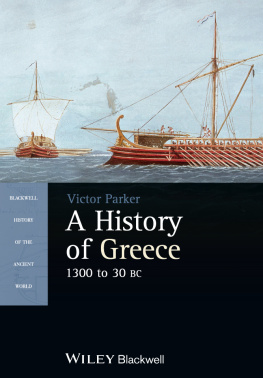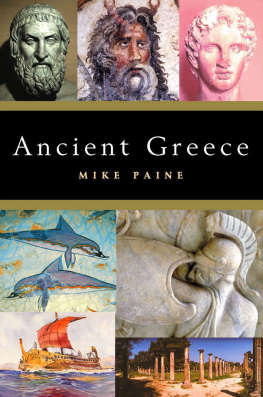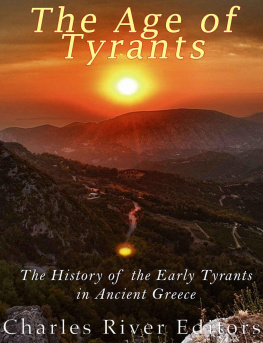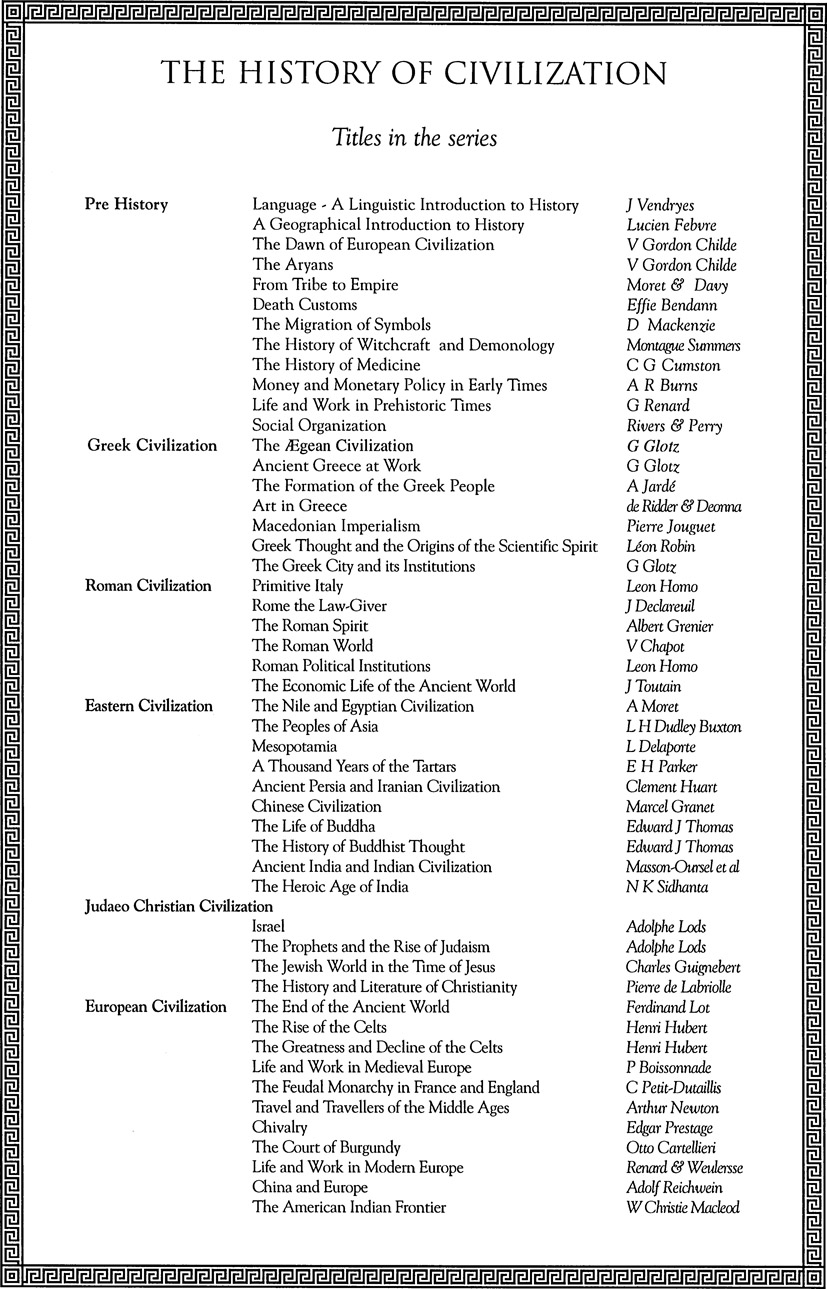X ENOPHON in his conomicus places in the mouth of Socrates a superb eulogy on agriculture. Work in the fields is not merely a source of pleasure; it gives strength to the body and hardihood to the soul, and it teaches even the free man justice and solidarity. It is the most honoured profession because it gives the community the best citizens. The most beautiful of the arts is also the most useful. Agriculture provides sufficiency, if a little will-power is exercised. She opens her arms to all who come to her and offers them all they wish, knowing how to receive her guests with magnificence. She is the mother and nurse of the other arts; when Agriculture thrives all the others thrive with her; wherever the land is left untilled almost all the other arts perish, on land and on sea. A purpose lies beneath Xenophons words. He is contrasting the riches drawn from the earth, which in his eyes are alone a reality, with the riches in money displayed by commerce and industry. He is expressing the Physiocratic prejudice, like Plato and Aristotle. But most of the Greeks, and probably most of the Athenians, thought the same as the philosophers on the subject. Landed property still retained much of the almost exclusive importance which it had had for so many centuries; by the very fact that the foreigner was debarred from it, it kept all its old prestige. No doubt agriculture found itself losing ground in an economic world invaded by commercialism. It suffered more and more, in an age of international competition, from having no asset but a small portion of meagre soil. For all that, the land remained the sole means of livelihood in many countries, and the chief resource of the citizens even in a country which had so definitely embraced marine trade as Attica.
The distribution of the land differed greatly in the various cities. In many parts individual appropriation had been only incompletely carried out, or else it had not rendered the land easily transferable and divisible, or else it had allowed rich men to round off their estates by purchase and the realization of mortgages. Pindar constantly shows us the great land-owner, devoted to horses, chariots, and physical exercise, the great lord of the high mien and the open hand, who is glad to invite poets to sing the nobility of his race, the wonders of his mansion, and his own great achievements. In Thessaly the Scopads displayed royal opulence, and a cavalryman from Pharsalos, before taking the field, offered a contribution of twelve talents (2,800), with two hundred serfs raised on his land. Gellias of Acragas had in his wine-store three hundred tanks in which he could keep 30,000 amphoras of wine (260,000 gallons). In Laconia the law made a vain pretence of maintaining for ever the kleros of moderate size with its human live-stock. When victory had heaped gold and silver in Sparta, alienation by deed of gift or will had to be authorized; the creditors had means to legalize evictions, and the women, to whom the law against making use of movable capital did not apply, prepared the way by very one-sided loans for inevitable expropriations. The valleys of the Eurotas and the Pamisos offered the agrarian capitalist a magnificent field of operation. The concentration of property was effected there with unprecedented rapidity; at the time of Aristotle, as we have seen, some owned immense fortunes, the others had almost nothing.
While Laconia was becoming a typical country of large properties, Attica presented a particularly remarkable example of the opposite state of things. It had changed much since the days when it, too, had belonged to a small number of Eupatrids.
We know from the census of the classes how small, medium, and large property were regarded in Solons time. The small holders or Thetes were those who did not obtain from land of their own more than 200 measures of solid or liquid, i.e. 285 bushels of corn or 1,716 gallons of wine and oil. To be classed as a medium proprietor or Zeugites it was therefore sufficient to own between 7 and 10 acres of vineyard; the farmer who grew only corn must, with the fallow in alternate years, have between 30 and 50 acres; the man who produced his own wine and bread had not more than 25 acres. Thus the lower limit of medium property in Attica is the same as that given in the official documents in France; the reason is that it depends on physiological needs rather than on economic phenomena. But this is by no means the case with the upper limit. In France it is fixed at 40 hectares (98*8 acres). The Athenian rose into the class of the Knights, the great land-owners who had to furnish a horse to the State, when he had 300 measures, i.e. 429 bushels of corn or 2,574 gallons of wine and oil. A vine-grower counted as a big proprietor if he had 12 or 15 acres, a corn-grower, if he had 45-75 acres, and the man who grew an equal amount of corn and wine, if he had 30-45 acres. Above these came the very greatest land-owners, the Pentacosiomedimni, whose land had to yield 500 measures, 712^ bushels of solid or 4,268 gallons of liquid. It could well do this with 20 or 25 acres of vineyard, or with 75-125 acres of corn-land, or with 50-75 acres of mixed land. Thus, at the time when the Athenian people was still groaning over the appropriation of the land, it regarded as a very large property an estate which in the countries of our time would be placed in the middle class of medium property.
Later the rule of dividing up an estate on succession and the progress of vine-growing split up the land without ceasing. In the IVth century the legal speeches of the orators give us the value of eight estates. They are assessed or sold at between 2,000 and 15,000 drachmas, and the only two which are quoted at two talents and two and a half talents, with an income of 800 and 1,200 drachmas, are situated in the exceptionally fertile plain of Eleusis and Thria. The poletai , whose duty it is to collect the tax on sales of land, record estates of small and sometimes very small value; there are plots worth 50 drachmas, and, though the maximum reaches 15,000 drachmas (just as in the orators), the average for sixteen lots is below 2,100 drachmas. The inscriptions on the mortgage-stones tell the same story. In a series of twenty-four loans only one is for a sum of 8,000 drachmas, secured on a house and a field; on unbuilt property the average is about 1,830 drachmas.
But we must see what was called a big estate at that time. The son of Aristeides received as a national gift 100 plethra of plough-land and as much under trees, 45 acres in all. In those days, says Demosthenes, the State must have been rich in land to indulge in such munificence. Apart from one exceptional case, the largest property which Attica could show as against the vast domains of Laconia measured 300 plethra , or 64 acres.
This state of things was common to the democratic cities. Itseems to have prevailed in Asia Minor and the islands. In the Vth century Chios divided confiscated land into six lots and sold them at prices varying between 1,700 and 5,340 staters or double drachmas. At Halicarnassos, out of fifteen estates, four were sold for between 50 and 342 Phoenician drachmas, six for between 500 and 1,000, and three for between 1,000 and 2,000; only two reached a higher price, the dearest attaining to 3,600 drachmas, and the average price was 990 Phoenician drachmas (32 8s.). In the IVth century, at Iasos, confiscated goods were sold at prices varying between a minimum of 98 drachmas and a maximum of at least 6,720 drachmas; but three men had to combine to secure the big lot, and several joined forces to obtain a lot worth 1,120 drachmas. The dividing up of land is regarded by Aristotle as a general phenomenon. With the Utopias of Plato he contrasts reality. In fact, he says, no one is destitute, because properties are divided indefinitely.

